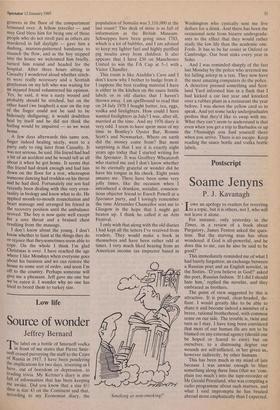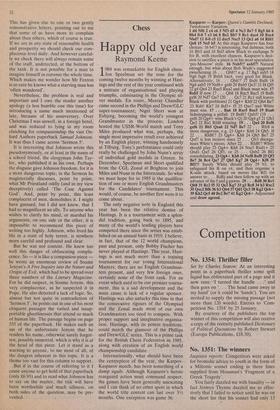Postscript
Soame Jenyns
P. J. Kavanagh
• T owe an apology to readers for reverting to a topic, but it is others, not I, who will not leave it alone.
For instance, only yesterday in the Times, in a review of a book about Purgatory, James Fenton asked the ques- tion: 'But the starving man has often wondered: if God is all-powerful, and he does this to me, can he also be said to be good?'
This immediately reminded me of what I had barely forgotten; an exchange between a Russian poet and an English novelist, in the Sixties. 'D'you believe in God?' asked the poet, Russian fashion. 'If I did I should hate him,' replied the novelist, and they embraced as brothers.
The point of view suggested by this is attractive. It is proud, clear-headed, de- fiant. I would greatly like to be able to share it and become indeed a member of a brave, rational brotherhood, with common sense on our side. The trouble is, twist and turn as I may, I have long been convinced that most of our human ills are not to be blamed on any external agency (should one be hoped or feared to exist) but on ourselves; to a distressing degree our wounds are self-inflicted, or 4are given us, however indirectly, by other humans.
This has been much in my mind of late because I was unwise enough to blurt something along these lines (that we 'com- plain too much') into the tape-recorder of Mr Gerald Priestland, who was compiling a radio programme about such matters, and what I said impromptu he has bruited abroad more emphatically than I expected.
This has given rise to one or two gently remonstrative letters, pointing out to me that some of us have more to complain about than others, which of course is true. If we are in any state of reasonable health and prosperity we should check our com- placence level daily. And however careful- ly we check there will always remain some of the stuff, undetected, at the bottom of the tank. It is not possible for a man to imagine himself in extremis the whole time. Which makes me wonder how Mr Fenton is so sure he knows what a starving man has 'often wondered'.
Nevertheless, the problem is real and important and I owe the reader another apology (a less humble one this time) for introducing a name much mentioned of late, because of his anniversary. Over Christmas I was unwell, in a foreign hotel, and was reduced to lying in my room clutching for companionship the vast Ox- ford Authors paperback Samuel Johnson. It was thus I came across 'Sermon 5'.
It is interesting that Johnson wrote this pseudonymously, or at least in the name of a school friend, the clergyman John Tay- lor, who published it as his own. Perhaps the disguise gave Johnson freedom, for it is a most dangerous topic; in the Sermon he magisterially discusses, point by point, what Mr Priestland oddly (and in my view deceptively) called The Case Against God'. And, point by point, this least complacent of men, demolishes it. I might have guessed, but I did not know, that I had so magnificent an ally. To anyone who wishes to clarify his mind, or marshal his arguments, on one side or the other, it is impossible to recommend this piece of writing too highly. Johnson, who lived his life in a state of holy terror, is nowhere more careful and profound and clear.
But he was not content. He knew too well this danger of obfuscating compla- cence. So — it is like a companion-piece — he wrote an enormous review of Soame Jenyns's A Free Inquiry into the Nature and Origin of Evil, which had to be spread over three numbers of the Literary Magazine. For he did suspect, in Soame Jenyns, this very complacence, as he suspected it in Pope. He also detected a lack of logic. So, almost but not quite in contradiction of 'Sermon 5', he points out in one of his most eloquent passages the varied and insup- portable ghastlinesses that attend so much of human life. The passage begins on page 535 of the paperback. He makes such an ass of the unfortunate Jenyns that he renders his name, otherwise surely forgot- ten, possibly immortal, which is why it is at the head of this piece. Let it stand as a warning to anyone, to me most of all, of the dangers inherent in this topic. It is a theme too vast for this column to support.
But if in the course of referring to it I cause anyone to get hold of that paperback (only £6.95) and to read what Johnson has to say on the matter, the risk will have been worthwhile and much silliness, on both sides of the question, may be pre- vented.







































 Previous page
Previous page